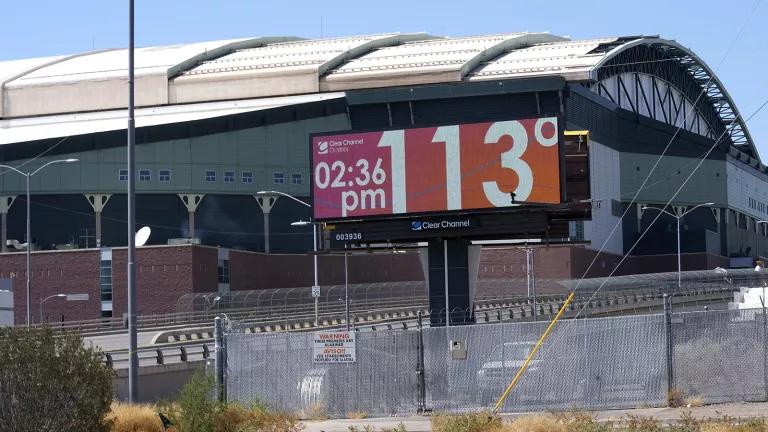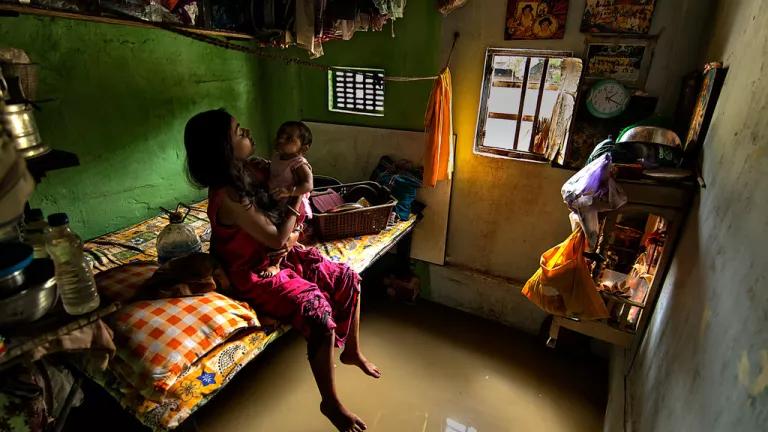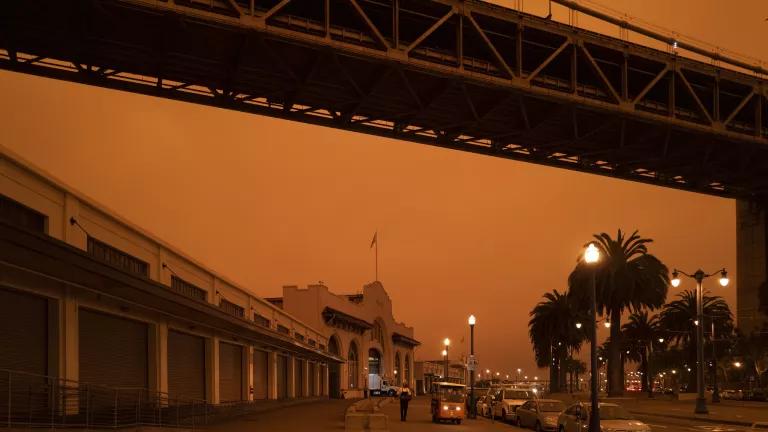IPCC: Climate Harms Are Already Costing Us, But There’s Hope
Without rapid, transformative action to wean ourselves off of fossil fuels, our hotter world will become increasingly dangerous, costly, and unpredictable—and widen health and economic disparities.

Wildfire smoke engulfed downtown Portland, Oregon on September 13, 2020
John Flood (via Flickr)
This week’s landmark report from Intergovernmental Panel on Climate Change (IPCC)’s Working Group 2 on Impacts, Adaptation, and Vulnerability paints an alarming picture of escalating climate change hazards—worsening wildfires, floods, coastal storms, heatwaves, air pollution episodes, infectious disease outbreaks, and disruptions to home, work, and livelihoods—that could soon outpace our ability to cope, absent transformative changes in our global energy system. But it also makes clear that, while we have the tools to respond to worsening climate change hazards, we need much bolder action to implement preparedness and response plans that meet the scale of this existential crisis.
Here are four key takeaways from the report on how climate change ills are already costing us, and how we can respond in ways that protect people and advance equity:
1. Overall, the rising financial costs and economy-wide risks of compounding climate hazards are undeniable.
The report explains how rising temperatures, floods, droughts, and sea level rise hurt multiple sectors across our economy, including workers themselves. Whether it’s farming, forestry, fisheries, tourism, or outdoor labor—a hotter planet is also more dangerous and difficult to work in, and costlier for businesses to operate in because of compounding supply chain problems and transportation infrastructure disruptions that threaten worker well-being.
Beyond overall economic harm and chaos, the report shows how individual livelihoods are threatened from decreasing agricultural productivity, rising human health risks (including increasing food insecurity), destruction of homes and vital infrastructure, and devastating personal losses of income and property. Importantly, those damages are not being felt equally: gender and racial inequity is widening because of climate change impacts that seem to be accumulating faster than even climate scientists had expected.
2. Scientists are linking climate change to health harms and related financial costs.
Previously, the 4th U.S. National Climate Assessment in 2018 identified “hundreds of billions of dollars” in economic costs of climate change impacts by the end of this century. The IPCC report highlights studies on the economic impacts of climate-sensitive events. The physical health and mental health-related costs of injuries, illnesses, and deaths caused by climate-sensitive events have historically been difficult to track and are often excluded from large assessments of disaster damages. The evidence that does exist is striking in its staggering scale. For example, during California’s 2018 wildfire season (the largest fires the state had experienced at the time, a record that was eclipsed just two years later), scientists estimate that 3,652 air pollution-related deaths from skyrocketing smoke levels caused $32 billion in health-related damages.
Elsewhere, the report points to heavy economic burdens from extreme heat, which imposes costs on consumers through higher energy needs for lifesaving air conditioning, and expenses from higher rates of heat-related illness (including medical care costs and lost work wages). Recent science indicates that more than one-third of heat-related deaths between 1991-2018 globally were due to climate warming. Climate change-fueled hazards increasingly endanger human health and drive healthcare utilization and costs. Our public health data systems need to be modernized to enable wider estimation of health-related costs to individuals, families, employers, and public and private health insurers.
3. Reducing climate pollution from burning coal, oil, and gas will deliver major health benefits.
The evidence is clear: fossil fuels threaten human health, impair the economy, and trigger potentially irreversible harms to natural systems. Fossil fuel-generated air pollution disproportionately burdens people of color and low-income communities and is linked to a growing list of chronic heart, lung, and brain illnesses and health costs to treat them. Because fossil fuels are such a health-damaging energy source, transitioning towards renewable energy options like solar and wind will help to secure a livable, healthier future for all.
The IPCC report points out that the financial value of health benefits from improved air quality alone is projected to be greater than the costs of meeting the goals of the Paris Agreement to keep global warming “well below” 2°C (3.6°F) compared to the pre-industrial era. Again: the value of society-wide health benefits will far exceed the costs of making the clean energy shift.
4. Community adaptation solutions are available; only implementation barriers are holding up progress.
Increasingly, communities are responding to climate risks through adaptation that improves preparedness and shores-up physical infrastructure to a changing climate. Adaptation can take many forms, including health-focused early warning systems, green infrastructure, and improved urban design, but scaling up these solutions is a big challenge.
Because many adaptation actions can take years to achieve their promise, closing the current adaptation financing gap will require strong policies over the near term from governments, business, civil society leaders, and individuals at a scale and speed significantly faster than what’s been achieved to date, according to the experts.
Our window to act is closing quickly.
The science summarized in IPCC’s latest report is sobering. Without rapid, transformative changes in our global energy system to wean ourselves off of fossil fuels, our hotter world will become increasingly dangerous, costly, and unpredictable—and widen health and economic disparities. That means that in the U.S., it is crucial that Congress pass President Biden’s proposed investments in clean energy and environmental justice. In order to protect human health and safety worldwide, reduce longstanding inequities, ensure a stable economy, and secure a livable future for all, we must commit to fight for sustained policy actions and investments to counter this growing crisis. This is a fight on which lives depend.




